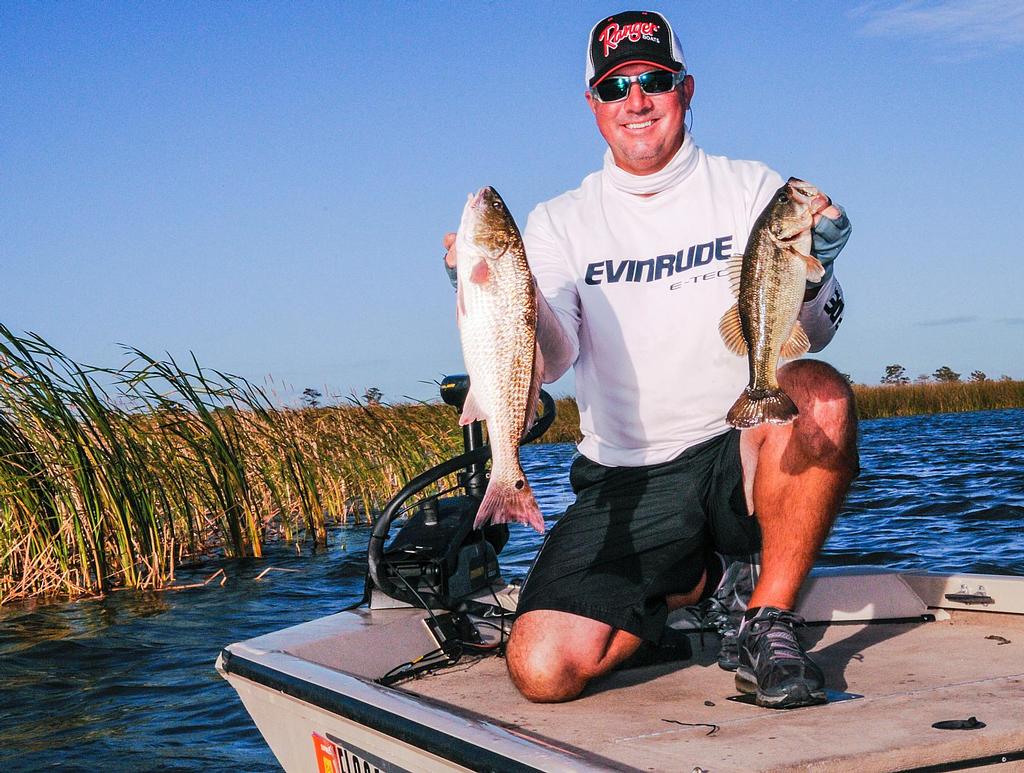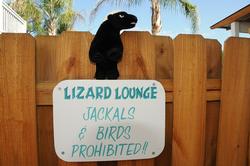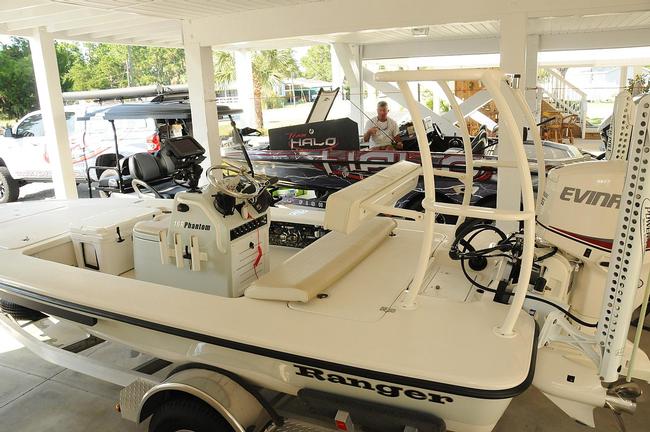Randall Tharp Q&A
The 2013 Forrest Wood Cup champ talks fortune, fame, football and flats skiffs.

Q: How has winning the Forrest Wood Cup changed your life?
A: There is no denying it, when you win that amount of money at one time, it does change your life to a certain degree. Even if you walked into a convenience store, bought a scratch-off ticket and won $500,000, it would change your life, unless you were already some kind of multimillionaire.
So to win that much money is sort of surreal. But one misconception I do want to clear up is that I did not take a half-million dollars and blow it on a beachfront mansion in Florida. [Laughing] I think some people might be under the impression that I took all my winnings and bought a giant house on the Gulf of Mexico like a rock star. That’s not true. I actually sold my home in Birmingham and bought a house in a coastal town in Florida long before I won the Cup. Now, it is true we were in the midst of moving from Alabama to Florida during the Cup last year, but the house was already purchased before I even finished the 2013 Tour season. The Cup winnings went straight to my fishing account, which is what has funded my fishing career since day one: tournament winnings. And in that regard, yes, it has given Sara and me quite a bit of breathing room in terms of the financial stresses that fishing for a living can cause.
Q: How has winning the Cup changed your career?
A: Following the Cup win, I did a lot of media in the form of radio, television, print, news interviews, personal appearances, speaking engagements, etc. Shortly after the Cup win I won a B.A.S.S. Open on Ross Barnett, which then qualified me for the 2014 Bassmaster Classic and the 2014 Elite Series. And that only seemed to fuel the media storm even more. I spent a lot of the 2013-2014 off-season traveling for show appearances and for sponsors. It seems like the new benchmark to achieve in professional fishing these days is to win multiple events in a single season. Winning a single event, even a world championship, is certainly big. But what seems to really get the media’s attention is winning multiple events in a season. Look at what Jason Christie did last year with his three major wins and then Brett Hite this year and the buzz that created.
Most people might think that just because you have won a big championship event like the Cup, you can just sort of kick back and rest on your laurels. But that’s not the case at all. It has kind of an opposite effect, in that it pushes you even harder. It’s not like, "Hey, I just won $500,000 so I can sleep in for practice for the next tournament." It’s more like, "I just won a tournament, so I’ve got to get to the next one and practice even harder than I did for the one I just won." Winning gives you a first-hand perspective of where the winning bar is set. Once you know where that is, it causes you to push yourself harder to stay above it.
Success breeds success, and nothing could be truer in the sport of pro fishing. The success of winning the Forrest Wood Cup has certainly helped propel me to more tournament success.
Q: So you mean to tell me you won $500,000 in the Forrest Wood Cup and you didn't splurge on anything for yourself?
A: OK, I might have afforded myself a small luxury in the form of a new Ranger Phantom flats skiff with an Evinrude E-TEC. I love that little boat. It’s light and so fuel efficient; great for stalking fish in super-shallow bays here in Florida, which is what I love to do. I just feel invisible in that thing.
Q: You just used the word “stalking.” If I were to describe your fishing style, I would say you are a stalker – in a good way. You tend to stalk, almost hunt fish down, in shallow water, until you make them bite. Would you agree with that?
A: I guess. I mean I don’t exactly rip down the banks with 15 rods like Bryan Thrift, and I don’t read a meter like Brent Ehrler. So, yeah, I guess I feel most comfortable when I find shallow fish that are reluctant to bite to a point where fishing is considered tough. I like areas or patterns where getting just five or six bites a day is at a premium. I like it when a “flurry” is catching two 3 1/2-pounders in a 15-minute window and then there might not be another “flurry” for three hours. That kind of fishing requires a lot of persistence, dedication and focus while the clock is ticking.
Q: So you have now lived on the coast for a year stalking saltwater fish in your Ranger Phantom. How has that changed you as a fisherman?
A: Living at the coast has been a doubled-edged sword. On one hand, it’s a distraction to my bass fishing. Let’s just say I spend far less time working on bass tackle these days because I’m out on the bay chasing something. But on the other hand, the ocean is just an awesome, unforgiving place with a lot of big stuff that swims in it. It’s constantly changing – wind, tides, clarities, currents. No two days are exactly alike. And in that respect, it’s a great place to practice the instinctual side of my fishing – sharpening that sixth sense of finding fish. To me the ultimate reward in fishing comes from that feeling you get when you know you are around fish based on current conditions – the here and now – and then having that feeling about a particular action, size or color a bait needs to have to get the fish to react. And when a fish eats your stuff, verifying those ideas, it’s a very strong, rewarding experience, no matter what species you’re after. So in that respect the coast is a fantastic environment for that kind of fishing exercise, so to speak.
Q: What does it mean to you to come into the Lake Murray event as the reigning Forrest Wood Cup Champion?
A: I mean, on one hand, it’s great. I’m the reigning champ. But once the green flag drops on Murray, it’s not like I get a head start or a few extra pounds in my livewell because I’m the previous champion. It all starts from zero, and being the previous champ offers no advantage. In those other guys' eyes, I’m just another guy they want to beat. Trust me, no one is going to get out of my way on the first day at Lake Murray just because I am the previous champion.
Q: Do you think you can win again and be the first back-to-back Forrest Wood Cup champion?
A: That’s kind of a tricky question. I’ve been down this road before, and it’s a slippery slope. Personally, I know exactly how I feel about the Forrest Wood Cup on Lake Murray. But if I were to publicly say it and explain why I feel that way, I’d get called cocky and arrogant or whatever. It’s happened to me in other interviews, so there is no need to go there again.
Along those same lines, I will say this sport does fascinate me in that we have these things called tournaments, which are, by definition, a competition where there is only one winner – and I emphasize one winner. And we all enter these tournaments because each and every one of us thinks he can win. But if we publicly say we think we can win, then we are somehow cocky. I don’t really understand it. Maybe we should have a tournament where everyone is a winner, and then no one would run the risk of being cocky [laughing].
Q: I see on your refrigerator a quote from University of Alabama head football coach Nick Saban that reads, “Mediocre people don’t like high achievers, and high achievers don’t like mediocre people.” Do you consider yourself a high achiever?
A: I simply like the way Nick Saban runs his football program. It’s a quote I heard him say on a national interview on 60 Minutes; that’s all it is. His quest for perfection is tireless, and as a competitor in bass tournaments I understand that.
Q: On your fence is a stuffed honey badger guarding a sign that reads "Jackals and Birds prohibited!!" Once and for all, can you please clarify the whole honey badger thing?
A: It was just a hilarious viral video on YouTube several years ago. The whole premise was this animal lives in the desert, one of the most hostile environments on Earth, and he is pretty much immune to all the adversity he encounters all day long. He almost welcomes adversity because, as the saying goes, "The honey badger don’t care." If he can only find some nasty larva to eat, he don’t care; the jackals and birds come around and try to steal his scraps, he don’t care; he gets bitten by a cobra, he don’t care. And basically the whole thing reminded me of fishing tournaments because so much of it is dealing with adversity. The wind is going to blow 25 mph, the water temperature is going to drop 15 degrees, a big bass is going to come off, there are going to be other people on your best spot when you get there, and I became immune to it all after watching that video like 100 times.
this animal lives in the desert, one of the most hostile environments on Earth, and he is pretty much immune to all the adversity he encounters all day long. He almost welcomes adversity because, as the saying goes, "The honey badger don’t care." If he can only find some nasty larva to eat, he don’t care; the jackals and birds come around and try to steal his scraps, he don’t care; he gets bitten by a cobra, he don’t care. And basically the whole thing reminded me of fishing tournaments because so much of it is dealing with adversity. The wind is going to blow 25 mph, the water temperature is going to drop 15 degrees, a big bass is going to come off, there are going to be other people on your best spot when you get there, and I became immune to it all after watching that video like 100 times.
Q: What’s the biggest lesson you’ve learned from being the Forrest Wood Cup champion and having a bird’s eye view of the sport from atop?
A: Well, probably it’s that tournament bass fishing is not exactly the center of the universe. In fact, it’s not even the center of the fishing universe. Don’t get me wrong, tournament bass fishing is my passion, my living, and I love it, like a lot of people who fish FLW. But I can tell you this: I’m a Forrest Wood Cup champion, and in the town I live in, the guy who brings in the biggest kingfish or cobia for the week is a bigger fishing hero than I am. Heck, in my mind, the guy who brings in a boatload of fresh oysters for the local oyster bar is the real fishing hero! Down here there are commercial fishermen, offshore fishermen, inshore fishermen, kayak fishermen, guys who only fish for tarpon with a fly rod – so many different versions of fishing that are just as important to those guys as bass fishing is to me. Being a Forrest Wood Cup champion and living in a fishing town on the coast of Florida have both given me a lot of perspective of where our sport falls in the bigger picture of fishing itself. And at the end of the day, fishing is what you want it to be. It’s how you want to pursue it. It’s what you make of it. No matter if you’re catching bream on crickets, fishing in a $500,000 championship or tonging up a bushel of oysters – being on the water pursuing something that totally fires you up is what it’s all about. And that’s going to be happening in just a few days on Lake Murray, and I can’t wait.
